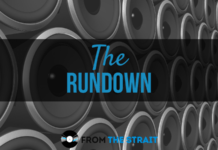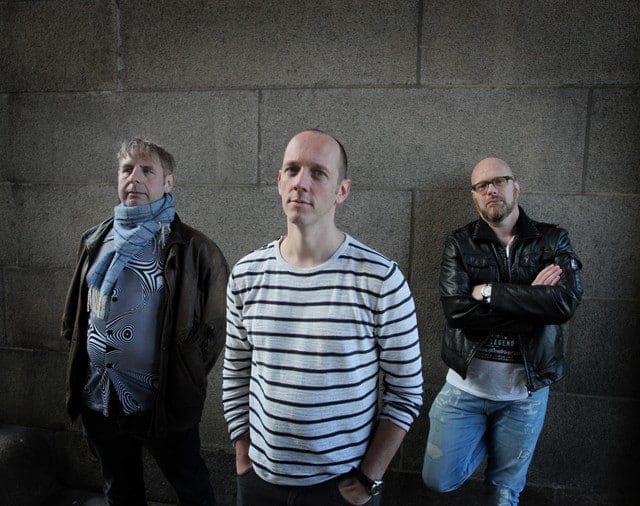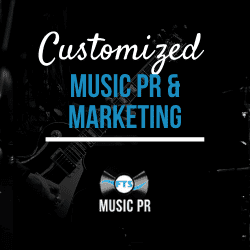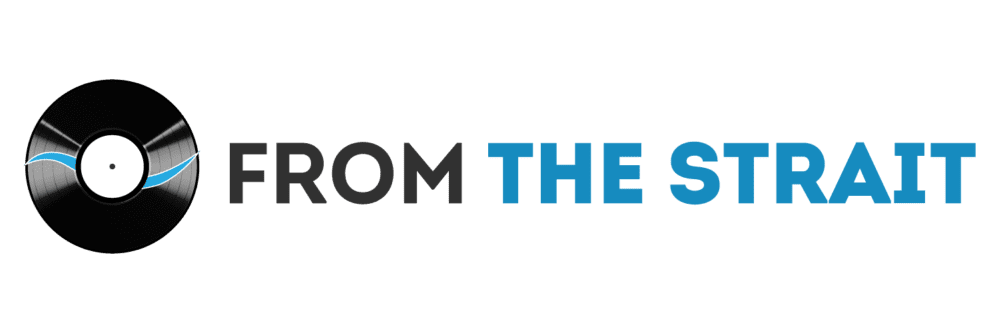Let’s take another trip Beyond The Strait and get to know a great three-piece from the Netherlands. KOLBAK is an indie pop rock band that defies genres, experimenting with many different styles and sounds. With the release of their single “Once” from their EP Twists and Turns, we caught up with KOLBAK for an extensive interview, a rare occurrence when each member had the chance to give their full answers to every question. Get to know the band, and then have a listen to “Once”!
From the Strait: Who were your musical influences growing up, and how to do they differ from your current ones?
Harold Pflug (singer, guitarist and main songwriter): I guess my musical taste has always been pop mixed with an off-kilter edge. I really started listening to music at the precocious age of three, since my sister taped her favorite top 40 songs on a cassette (my parents were not exactly musical role models). I think that was the basis of my eclectic approach to music today. This was around 78, so Grease would mix with Kiss, Bowie, Boomtown Rats etcetera. I heard those songs over and over again and I can still recollect the song order on each cassette. So they were definitely the base. But I really got involved in music because of Duran Duran and a-ha. I was about eight or nine years old. They fueled me with — I guess — pop sensibilities and they definitely made me want to be in a band, but even at that age I tended to go with songs that were a wee bit edgier than my sister’s choice (she would spin a lot of Wham!). I vividly remember begging her to let me have Echo and the Bunnymen’s 45 of “Bring On The Dancing Horses”.
By the time I was in high school, I hopped from one genre to another, and my eclecticism went off the charts: hip hop, R ‘n’ B, metal, indie, movie scores (I’m an avid soundtrack collector), post punk, you name it. But the artists that formed me were De La Soul, Joe Jackson, R.E.M., songs by George Gershwin and a little later on Pearl Jam, Primus and Radiohead.
They all sparked the fire, showed me how to be musically creative, how to write lyrics, and foremost: they taught me to be your own dog. Plus: when you mix genres you can come up with even better ones and not be pigeonholed. I’m not sure you can hear all this in “Once”, but when you flip the KOLBAK catalogue, you can hear it.
Dennis Aaij (drums): Well, I grew up listening to my dad’ s record collection at the time he somewhat lost interest in music. It was a small collection but he had some records that stood out for me. Especially albums by Deep Purple, Bad Company and Brainbox got me hooked on music. I remember listening in bed to hardrock on noisy pirate radio at night, recording cassette tape after cassette tape. I broadened my horizon almost immediately. At age 11, popular radio got me into Elvis Costello, David Bowie and Talking Heads and it was around that time I started playing the drums. At the same time I knew I was a little more into the Beatles than into the Stones.
The stuff I currently like to listen to (Wilco, Yo La Tengo, Spoon, New Model Army and London Grammar to name but a few) is still made by genuine craftsman and -women, so there’s no difference there. The difference between then and now is that I listen to music being a musician myself. Knowing how to play an instrument, how recording an album works, and playing live in front of an audience feels like, thát changes the way you listen to music. So is there a difference between early influence Ian Paice from Deep Purple and current influence Glenn Kotche from Wilco? Yes, in playing style and technique and No because listening to either one makes me want to get behind my drumkit.
Rick Ruhland (bass guitar): I grew up with the early sounds of rock and roll (Presley and the likes). Also a big part of my first decade of my life ‘Schlager’ from the sixties and seventies like Freddy Quinn, Udo Jürgens and Freddy Breck. It still gives me a strong feeling of ‘Heimweh nach damals’. Another German oriented music style in the house I grew up (I had a German father) in was brass-band music from bands like Ernst Mosch, and dixieland from artists like Aker Bilk and Kenny Ball (the ‘white guys dixieland). So, my musical youth is a very mixed bag.
When I became musically mature (at the age of 12, 13), I started listening to music my parents had no idea of. Experimental music by Pink Floyd, boogie rock by, for example, Status Quo, Neue Deutsche Welle with bands like Ideal, ska (Madness!), old school reggae (e.g. Desmond Dekker) and new wave (debut records by U2, The Cure, Joe Jackson) started to rule my world. This was also the time I started playing on stage in my first band. At the same time I have discovered classical music by Bach and Satie, which is still, to this day, a big part of my daily dose of music. I love modern big bands (Harry Connicks Blue Light Red Light is one of the finest cds ever, both songwriting and production). Classic bands and artists like The Beatles,
David Bowie. Crooners like Frank Sinatra. There’s virtually no end to the music I like.
So, what has changed in the course of my live and my music? My current taste of music and therefore my bass playing style and my song writing, has a base in the music of my youth, but has also been influenced by ambient-techno-dub (think The Orb), folkrock, minimal music (piano) postrock like Sigur Ros, alternative and college rock (I hate those terms, but okay) like REM and Radiohead, British bands from 80’s and 90’s like Suede, The Smiths, The Housemartins, and so on.
FTS: Tell us about your new single “Once”.
Harold: It’s the closing song on our EP “Twists and Turns”, which was released to favorable reviews in September. I think it is a hopeful song and theses are hard to do. The song was written in the aftermath of a rough period for me. So the theme of the song — pull yourself together and out of this daily sameness — definitely originated there. Having said that, it is a work of fiction wherein the main character is much more stuck in his loop hole than I ever was. Maybe I wrote it with cathartic intentions. I don’t know. But I think everyone has moments in their lives where one finds oneself go round in circles, not really getting anywhere and hoping for something to pull them out of it all. Willing yourself to do something. It’s different from the other songs, in that the characters in the other ones are mean or over-conscious or even doubtful, so the record ends with a streak of positivity, I think.
Dennis: “Once” is a song where I think you can hear the influence of Glenn Kotche on the drum track. I chose not to play HiHat on this song. Instead I attached the headless tambourine to my HiHat stand so I could play the tambourine using my foot, leaving my hands to play toms and snare. The groove is very laid back which works great with the way Harold sings the song; somewhat determinate. Together with the wailing guitar and Rick’s weaving bass, the song is nothing short of a perfect blend.
Rick: The first times we started throwing ideas to each other trying to catch the musical core of “Once”, the bass line felt alien to me in the sense that I picked notes that were raw. Edgy, not the collection of smooth base notes I would normally choose to play. Since I don’t really listen to the words of a new song when thinking about my bass notes, the song grew into the song on the EP that for me – is part a dialogue between guitar and bass in the verses, and a dialogue between drums and bass (chorus and solo). When we play Once live, it is one of those songs I have to dig into on stage, meaning: I am extremely aware of playing every note on the right spot (both the harmonics and the rhythm).
FTS: What’s next for KOLBAK?
Harold: KOLBAK will be promoting the EP with a couple of shows in the Netherlands, maybe in a few other surrounding countries. It’s been three years since our previous record “Sea” came out, and we hope to follow this one up a bit quicker with some new songs. Right guys?
Dennis: (smiles) More blending!
Rick: I would love to see us explore styles and (I suppose this is what Dennis is hinting at) blending styles. Also: longer songs, ‘small opera in one song’ kind of songs. Maybe the use of piano and keyboards instead of guitar? Maybe use some of our personal musical interests? Sky is the limit.
More songs. Quicker.
FTS: It’s the hardest question to answer, but one of our favourites to ask – if you were stranded on a desert island with only 5 albums, what would they be?
Harold: Oh jeez. That is a tough one. It so depends on my mood. I guess at the moment it would be these, ex aequo:
– Love – Forever Changes (and yeah it beats Class of ’67 mates Sgt Pepper and The Velvet
Underground and Nico)
– De La Soul – Three Feet High and Rising (The happy maker)
– This Mortal Coil – It’ll End in Tears (the post punk record to replace all others especially my Radiohead and Talk Talk albums that would have made the top ten)
– Elvis Costello and the Attractions – This Year’s Model (beating Joe Jackson, Wilco and XTC)
– Scram C Baby – The Thing that Wears My Ring (a witty, snarly and clever hidden gem by fellow Dutch garage noise rockers a la Guided by voices, something to remember home by).
Dennis: I can easily come up with ten of these lists but let me narrow things down to ‘Live Albums’, because I think that’s what I need most on a deserted island.
– The first record in my bag will be Made in Japan by Deep Purple. I’ve played along with this album for so many hours when I was just starting to play the drums! It’s full of memories and great songs that make me feel alive.
– I would also slide in The Trinity Session by The Cowboy Junkies. It’s debatable wether it’s a live album but to me it sure has the feel of it. The album was recorded in Toronto’s Church of the Holy Trinity with only one microphone and a Sony Betamax SL-2000 video cassette deck. I’ve never felt so much intimacy on one album.
– Third is Stop Making Sense by Talking Heads. It’s hands down the most creative live album ever recorded.
– I couldn’t go to the island without Tom Petty’s The Live Anthology. Recorded throughout his career, this 4 disc anthology simply contains 48 great rock songs to sing along to, even if you can’t sing, like me. But who cares! The island is supposed to be deserted, right?
– The last record i’d grab could very well be Life After Death by Iron Maiden. I guess if I’d be playing it really loud, a passing ship wil hear Bruce Dickinson’s screams and comes to rescue me. If that would be the case, I will no doubt bring ashore all 5 albums I brought to the island.
Rick: Oof. Phew. Whew. Oh dear. Even when setting aside music styles like classical music (Bach, Satie, Ockeghem), folk and folkrock (Runrig, Capercaillie, Peatbog faeries, Wolfstone), dixieland (Dutch Swing College) and so on? This is torture. Music is not out there to be restricted. If I have to choose, the list of just 5 albums also depends on the mood of the day / week / month. Nonetheless, my choices:
– Pink Floyd – The Wall
– Zappa – Joe’s Garage I
– Iron Maiden – Live After Death
– The Orb – Adventures Beyond the Ultraworld
– Marillion – The Thieving Magpie
Check out “Once”, the latest single from KOLBAK!
















